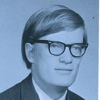Eric Arnold Rennie – 50th Reunion Essay
Eric Arnold Rennie
 9 Wexford Lane
9 Wexford Lane
Cromwell, CT 06416
ericrennie@comcast.net
860-635-1572
Spouse(s): Martha Lowenstein Rennie (1970)
Child(ren): Matthew (1973), Aaron (1976)
Grandchild(ren): Alexandra (2006)
Education: Yale College, BA 1969
Career: Public affairs and government affairs executive, 1973–2002
Avocations: Fine arts photographer (more than 90 shows around the country)
College: Branford
If you go walking in any old New England cemetery, you will see many tombstones are so worn by time that their inscriptions are barely legible, if at all. The granite used now to mark graves is more durable than the marble, slate, or brownstone once favored for this purpose. However, even the hardest rock will eventually succumb to the elements. In the end, nature defeats every effort to leave one’s mark on the world.
It is perhaps just as well. How do you sum up a lifetime in an epitaph? Andy Warhol came closest when he suggested a single word for his tombstone: “Figment.” His, at least, has the virtue of brevity, which is why I like the ancient tradition among Zen monks of writing a short poem before dying to mark the occasion.
Zen death poems, known as jitsi, typically take the form of a haiku (17 syllables, three lines) or a tanka (31 syllables, five lines)—neither of which leaves much room for an extended reflection on life or death. That, of course, is often the point: life is ephemeral and passes as if in a dream. Here’s a whimsical example from a monk named Mabutsu who died in 1874:
Moon in a barrel:
You never know just when
The bottom will fall out.
Once you’ve reached the biblical threescore years and 10, no one will be shocked when the bottom does fall out. In case I need any reminding, I note two of my three Branford College roommates, Eric Stiffler and Danny Friedlander, are no longer around to contribute to this volume.
Being asked to sum up 50 years in 500 words for one’s Yale classmates will defeat any serious attempt at reflection in prose. So, following Zen tradition, I will attempt a bit of poetry, although I am completely unpracticed in the art. If nothing else, this will serve as practice if I am inspired to dash off a parting shot before I graduate for good.
Here, unencumbered by rhyme or meter, is my not-yet-dead poem to mark the occasion of our Yale 50th:
We grow up thinking
We’re the still point
In a turning world,
As T.S. Eliot might say.
Perhaps so.
But I’ve noticed a change
As I’ve crept up on old age:
Rather than thinking life
Passes through me,
Like film through a projector,
Now I know
I’m just passing through myself.

Family Album
If the above is blank, no 50th reunion essay was submitted.
